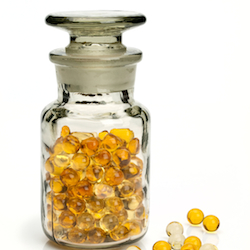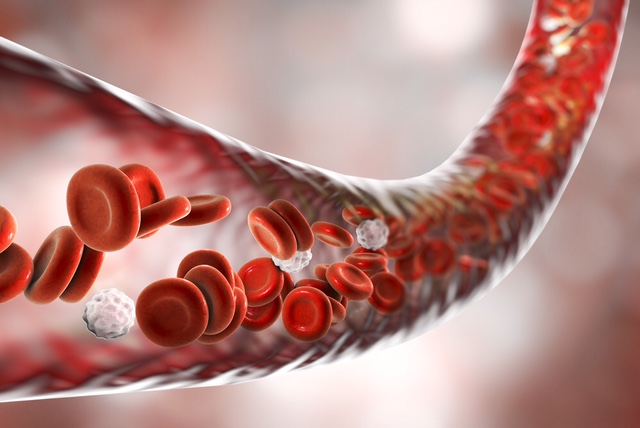Addressing a genetic issue & supporting cardiovascular health naturally.
Cardiovascular health for many only becomes a concern with age, unless familial factors or birth defects highlight it earlier in life. Yet it isn’t uncommon that a higher profile story splashes the news, which reminds us that it may be something we should be looking at with more comprehensive screening sooner.
 When Bob Harper, fitness guru and co-host of the hit show “The Biggest Loser,” suffered a massive heart attack at the age of 52, we were reminded of this when his story made the headlines. Although seemingly healthy, Mr. Harper had elevated levels of lipoprotein(a), also commonly referred to as Lp(a). Elevated Lp(a) levels are associated with a higher risk of coronary heart disease, stroke, and peripheral vascular disease,[1],[2] and are primarily dependent on genetics.[3] Elevations of this protein are not uncommon, with one in five Americans having levels that put them at risk, approximately tripling the likelihood of having a heart attack or stroke at a young age.[4]
When Bob Harper, fitness guru and co-host of the hit show “The Biggest Loser,” suffered a massive heart attack at the age of 52, we were reminded of this when his story made the headlines. Although seemingly healthy, Mr. Harper had elevated levels of lipoprotein(a), also commonly referred to as Lp(a). Elevated Lp(a) levels are associated with a higher risk of coronary heart disease, stroke, and peripheral vascular disease,[1],[2] and are primarily dependent on genetics.[3] Elevations of this protein are not uncommon, with one in five Americans having levels that put them at risk, approximately tripling the likelihood of having a heart attack or stroke at a young age.[4]
Despite the genetic predisposition for elevated Lp(a), levels of this protein still can be reduced by natural supplement therapies.
Coenzyme Q10
In addition to being essential for mitochondrial energy production, coenzyme Q10, commonly known as CoQ10, is well known for its cardiovascular health benefits.[5] At a dosage of only 60 mg twice daily, CoQ10 was shown to significantly decrease serum levels of Lp(a) after 28 days, with reductions of 31% compared to 8.2% with placebo.[6] A recent meta-analysis reinforced this study, finding that CoQ10 significantly reduced Lp(a) levels, with the effect being more pronounced in individuals with higher Lp(a) levels (≥ 30 mg/dL) initially.[7]
Additional meta-analyses have shown CoQ10 improves endothelial function,[8] decreases total cholesterol and triglycerides,[9] increases high-density lipoprotein (HDL) levels,[10] and in patients with type 2 diabetes, decreases HbA1c and fasting glucose levels.[11] Other studies have shown CoQ10 reduces low-density lipoprotein (LDL) oxidation,[12] as well as systolic and diastolic blood pressure in patients with diabetes.[13]
With the use of statin medications, which inhibit HMG-CoA reductase, the enzyme also necessary for the body’s production of CoQ10,[14] it is very important to include CoQ10 as a supplemental therapy. Reductions of CoQ10 levels with statin therapies have been shown to be approximately 40%.[15] Although this may contribute to symptomatic myopathy in only a small fraction of statin users, it is a dramatic decrease which may negatively impact the long-term health of a much larger group in many ways.
Tocotrienols
Tocotrienols are the lesser studied group of the naturally occurring vitamin E isoforms, with tocopherols, more commonly found in nature, dominating scientific research.[16] Tocotrienols have greater antioxidant potential than tocopherols,[17] and with this they bring a variety of benefits particularly where cardiovascular health is concerned.[18]
Treatment with 200 mg of tocotrienols daily for four weeks has been shown to significantly reduce Lp(a) levels by  17%, also reducing apolipoprotein B (ApoB), which is associated with an increased risk of atherosclerosis,[19] by 15%.[20] Animal studies have additionally shown tocotrienols help protect against atherosclerosis and its complications, with findings that tocotrienol supplementation reduces atheroma formation,[21] intimal thickening,[22] and levels of inflammatory mediators associated with atherosclerotic plaque destabilization.[23]
17%, also reducing apolipoprotein B (ApoB), which is associated with an increased risk of atherosclerosis,[19] by 15%.[20] Animal studies have additionally shown tocotrienols help protect against atherosclerosis and its complications, with findings that tocotrienol supplementation reduces atheroma formation,[21] intimal thickening,[22] and levels of inflammatory mediators associated with atherosclerotic plaque destabilization.[23]
In addition to reducing Lp(a) and ApoB levels, tocotrienols have been shown in human studies to decrease triglycerides,[24] total and LDL cholesterol,[25],[26] low-density lipoprotein (LDL) oxidation,[27] and high-sensitivity C-reactive protein (hs-CRP) levels,[28] as well as improve arterial compliance,[29] which directly impacts blood pressure.
Nattokinase and Lumbrokinase
One of the ways that an elevated Lp(a) level is associated with an increased risk of cardiovascular disease is through its relationship with fibrinogen,[30] the glycoprotein in the blood that is converted by thrombin into fibrin, forming a clot in the setting of vascular injury. Lp(a) inhibits the breakdown of fibrin, causing a hypercoagulable state.[31]
Nattokinase and lumbrokinase are two potent fibrinolytic enzymes that help to address this issue. Both help to decrease fibrinogen and disintegrate clots by breaking down fibrin, promoting healthy blood flow in not only arteries but also the small capillaries.[32],[33] This not only can be helpful for reducing risk of a clot or dissolving an existing one, but also for supporting a healthy balance of circulation and coagulation in any condition in which the other critical elements of Virchow’s triad (coagulation tendency, hemodynamics/blood flow, and endothelial function/injury) are an issue.[34] Parameters associated with bleeding should be monitored during nattokinase and lumbrokinase use.
Cardiovascular health is critically important, and for many, addressed all too late. Taking proactive measures to evaluate and support cardiovascular health will help to reduce the risk of future detrimental events. Diabetes, hypertension, and hypercholesterolemia are well established factors that increase the risk of heart disease and can be addressed by both medications and natural therapies.[35] Although elevated Lp(a) levels are an independent risk factor for the development of cardiovascular disease,[36] many of these natural tools may still help reduce this risk.
Dr. Carrie Decker, ND graduated with honors from the National College of Natural Medicine (now the National University of Natural Medicine) in Portland, Oregon. Dr. Decker sees patients remotely, with a focus on gastrointestinal disease, mood imbalances, eating disorders, autoimmune disease, and chronic fatigue. Prior to becoming a naturopathic physician, Dr. Decker was an engineer, and obtained graduate degrees in biomedical and mechanical engineering from the University of Wisconsin-Madison and University of Illinois at Urbana-Champaign respectively. Dr. Decker continues to enjoy academic research and writing and uses these skills to support integrative medicine education as a writer and contributor to various resources. Dr. Decker supports Allergy Research Group as a member of their education and product development team.
Sources:
[1] Emerging Risk Factors Collaboration, Erqou S, et al. Lipoprotein(a) concentration and the risk of coronary heart disease, stroke, and nonvascular mortality. JAMA. 2009 Jul 22;302(4):412-23.
[2] Hopewell JC, et al. Lipoprotein(a) genetic variants associated with coronary and peripheral vascular disease but not with stroke risk in the Heart Protection Study. Circ Cardiovasc Genet. 2011 Feb;4(1):68-73.
[3] Boerwinkle E, et al. Apolipoprotein(a) gene accounts for greater than 90% of the variation in plasma lipoprotein(a) concentrations. J Clin Invest. 1992 Jul;90(1):52-60.
[4] Rallidis LS, et al. High levels of lipoprotein (a) and premature acute coronary syndrome. Atherosclerosis. 2017 Dec 7;269:29-34.
[5] Pepe S, et al. Coenzyme Q10 in cardiovascular disease. Mitochondrion. 2007 Jun;7 Suppl:S154-67.
[6] Singh RB, Niaz MA. Serum concentration of lipoprotein(a) decreases on treatment with hydrosoluble coenzyme Q10 in patients with coronary artery disease: discovery of a new role. Int J Cardiol. 1999 Jan;68(1):23-9.
[7] Sahebkar A, et al. Supplementation with coenzyme Q10 reduces plasma lipoprotein(a) concentrations but not other lipid indices: A systematic review and meta-analysis. Pharmacol Res. 2016 Mar;105:198-209.
[8] Gao L, et al. Effects of coenzyme Q10 on vascular endothelial function in humans: a meta-analysis of randomized controlled trials. Atherosclerosis. 2012 Apr;221(2):311-6.
[9] Sharifi N, et al. The effects of coenzyme Q10 supplementation on lipid profiles among patients with metabolic diseases: a systematic review and meta-analysis of randomized controlled trials. Curr Pharm Des. 2018 Apr 5.
[10] Jorat MV, et al. The effects of coenzyme Q10 supplementation on lipid profiles among patients with coronary artery disease: a systematic review and meta-analysis of randomized controlled trials. Lipids Health Dis. 2018 Oct 9;17(1):230.
[11] Zhang SY, et al. Effectiveness of Coenzyme Q10 Supplementation for Type 2 Diabetes Mellitus: A Systematic Review and Meta-Analysis. Int J Endocrinol. 2018 Sep 16;2018:6484839.
[12] Thomas SR, et al. Inhibition of LDL oxidation by ubiquinol-10. A protective mechanism for coenzyme Q in atherogenesis? Mol Aspects Med. 1997;18 Suppl:S85-103.
[13] Hodgson JM, et al. Coenzyme Q10 improves blood pressure and glycaemic control: a controlled trial in subjects with type 2 diabetes. Eur J Clin Nutr. 2002 Nov;56(11):1137-42.
[14] Hargreaves IP, et al. The effect of HMG-CoA reductase inhibitors on coenzyme Q10: possible biochemical/clinical implications. Drug Saf. 2005;28(8):659-76.
[15] Ghirlanda G, et al. Evidence of plasma CoQ10-lowering effect by HMG-CoA reductase inhibitors: a double-blind, placebo-controlled study. J Clin Pharmacol. 1993 Mar;33(3):226-9.
[16] Peh HY, et al. Vitamin E therapy beyond cancer: Tocopherol versus tocotrienol. Pharmacol Ther. 2016 Jun;162:152-69.
[17] Theriault A, et al. Tocotrienol: a review of its therapeutic potential. Clin Biochem. 1999 Jul;32(5):309-19.
[18] Prasad K. Tocotrienols and cardiovascular health. Curr Pharm Des. 2011;17(21):2147-54.
[19] Cabezas Castro M, Liem A. [The use of apolipoprotein B in clinical practice to determine the risk for atherosclerosis]. Ned Tijdschr Geneeskd. 2003 Jul 26;147(30):1445-8.
[20] Qureshi AA, et al. Novel tocotrienols of rice bran modulate cardiovascular disease risk parameters of hypercholesterolemic humans. J Nutri Biochem. 1997 May 1;8(5):290-8.
[21] Teoh MK, et al. Protection by tocotrienols against hypercholesterolaemia and atheroma. Med J Malaysia. 1994 Sep;49(3):255-62.
[22] Nafeeza MI, et al. The effects of a tocotrienol-rich fraction on experimentally induced atherosclerosis in the aorta of rabbits. Malays J Pathol. 2001 Jun;23(1):17-25.
[23] Rahman TA, et al. Atheroprotective effects of pure tocotrienol supplementation in the treatment of rabbits with experimentally induced early and established atherosclerosis. Food Nutr Res. 2016 Oct 28;60:31525.
[24] Zaiden N, et al. Gamma delta tocotrienols reduce hepatic triglyceride synthesis and VLDL secretion. J Atheroscler Thromb. 2010 Oct 27;17(10):1019-32.
[25] Qureshi AA, et al. Dose-dependent modulation of lipid parameters, cytokines, and RNA by delta-tocotrienol in hypercholesterolemic subjects restricted to AHA Step-1 diet. Brit J of Med & Med Res. 2015;6(4):351-66.
[26] Qureshi AA, et al. Impact of delta-tocotrienol on inflammatory biomarkers and oxidative stress in hypercholesterolemic subjects. Clin Exp Cardiology. 2015;6(4):1000367.
[27] Mutalib MS, et al. Palm-tocotrienol rich fraction (TRF) is a more effective inhibitor of LDL oxidation and endothelial cell lipid peroxidation than α-tocopherol in vitro. Food Res Int. 2003 Jan 1;36(5):405-13.
[28] Pervez MA, et al. Effects of Delta-tocotrienol Supplementation on Liver Enzymes, Inflammation, Oxidative stress and Hepatic Steatosis in Patients with Nonalcoholic Fatty Liver Disease. Turk J Gastroenterol. 2018 Mar;29(2):170-176.
[29] Rasool AH, et al. Arterial compliance and vitamin E blood levels with a self-emulsifying preparation of tocotrienol rich vitamin E. Arch Pharm Res. 2008 Sep;31(9):1212-7.
[30] Heinrich J, et al. Relationship of lipoprotein(a) to variables of coagulation and fibrinolysis in a healthy population. Clin Chem. 1991 Nov;37(11):1950-4.
[31] Anglés-Cano E, et al. Inhibition of fibrinolysis by lipoprotein(a). Ann N Y Acad Sci. 2001;936:261-75.
[32] Hsia CH, et al. Nattokinase decreases plasma levels of fibrinogen, factor VII, and factor VIII in human subjects. Nutr Res. 2009 Mar;29(3):190-6.
[33] Cao YJ, et al. Oral fibrinogen-depleting agent lumbrokinase for secondary ischemic stroke prevention: results from a multicenter, randomized, parallel-group and controlled clinical trial. Chin Med J (Engl). 2013 Nov;126(21):4060-5.
[34] Milner M, Makise K. Natto and its active ingredient nattokinase: A potent and safe thrombolytic agent. Alt Comp Therapies. 2002 Jun 1;8(3):157-64
[35] Khot UN, et al. Prevalence of conventional risk factors in patients with coronary heart disease. JAMA. 2003 Aug 20;290(7):898-904.
[36] McCormick SP. Lipoprotein(a): biology and clinical importance. Clin Biochem Rev. 2004 Feb;25(1):69-80.
 When Bob Harper, fitness guru and co-host of the hit show “The Biggest Loser,” suffered a massive heart attack at the age of 52, we were reminded of this when his story made the headlines. Although seemingly healthy, Mr. Harper had elevated levels of lipoprotein(a), also commonly referred to as Lp(a). Elevated Lp(a) levels are associated with a higher risk of coronary heart disease, stroke, and peripheral vascular disease,[1],[2] and are primarily dependent on genetics.[3] Elevations of this protein are not uncommon, with one in five Americans having levels that put them at risk, approximately tripling the likelihood of having a heart attack or stroke at a young age.[4]
When Bob Harper, fitness guru and co-host of the hit show “The Biggest Loser,” suffered a massive heart attack at the age of 52, we were reminded of this when his story made the headlines. Although seemingly healthy, Mr. Harper had elevated levels of lipoprotein(a), also commonly referred to as Lp(a). Elevated Lp(a) levels are associated with a higher risk of coronary heart disease, stroke, and peripheral vascular disease,[1],[2] and are primarily dependent on genetics.[3] Elevations of this protein are not uncommon, with one in five Americans having levels that put them at risk, approximately tripling the likelihood of having a heart attack or stroke at a young age.[4] 17%, also reducing apolipoprotein B (ApoB), which is associated with an increased risk of atherosclerosis,[19] by 15%.[20] Animal studies have additionally shown tocotrienols help protect against atherosclerosis and its complications, with findings that tocotrienol supplementation reduces atheroma formation,[21] intimal thickening,[22] and levels of inflammatory mediators associated with atherosclerotic plaque destabilization.[23]
17%, also reducing apolipoprotein B (ApoB), which is associated with an increased risk of atherosclerosis,[19] by 15%.[20] Animal studies have additionally shown tocotrienols help protect against atherosclerosis and its complications, with findings that tocotrienol supplementation reduces atheroma formation,[21] intimal thickening,[22] and levels of inflammatory mediators associated with atherosclerotic plaque destabilization.[23]




